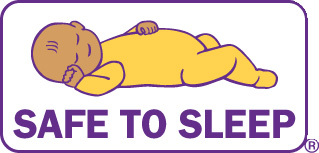** Suffocation Risk **
Remember CPSC’s "Dos and Don’ts" For Baby Sleep Spaces
Many young babies cannot lift their heads to pull away from soft objects that can pose a suffocation risk, such as bumpers, blankets, pillows, and sleep positioners. Also, a seated or semi-reclined position can cause your baby’s head to tip forward and their airway to be blocked.
Follow these simple tips to make every sleep a safe sleep:
DO:
Do use products intended for sleep including cribs, bassinet, play yard and bedside sleepers that meet federal requirements.
Do remember "Bare is Best" - nothing but a fitted sheet in a crib, bassinet or play yard.
Do always place baby on their back.
Do move your baby to their crib, bassinet, or play yard if they fall asleep elsewhere.
Do check our website for recalls (SaferProducts.gov) and sign up to receive recall notifications
DON’T:
Don’t add pillows or blankets to your baby’s sleep space.
Don’t use weighted blankets or weighted swaddles*.
Don’t allow your baby to sleep in an inclined product with an angle greater than 10º such as a rocker, bouncer or glider.
Don’t leave your baby unsupervised in products that aren’t designed for safe sleeping, such as any inclined product.
Inclined products, such as rockers, gliders, soothers and swings, should never be used for infant sleep. NIH.gov and CDC.gov
Learn How to Put Your Baby to Sleep Safely
If you just had a baby, are expecting, or are taking care of a young infant, it's important to create a safe sleep environment for your baby. Because babies spend much of their time sleeping, the nursery should be the safest room in the house. Take a few moments to learn about safe sleep.
Additional Safe Sleep Resources
The National Institute of Child Health and Human Development has a comprehensive Question and Answer page about how you can make sure your child is sleeping safely. Learn more about creating a safe sleep environment for your baby.

For more information, please visit the Safe to Sleep public education campaign led by The Eunice Kennedy Shriver National Institute of Child Health and Human Development (NICHD) of the National Institutes of Health (NIH) and in collaboration with other organizations.
Share on:
